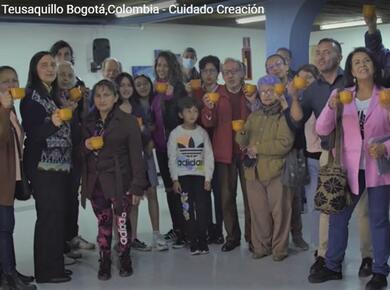Posted: May 2, 2023
Colombia
Now Israel, what does the Lord your God desire from you? … love him, serve him with all your heart and in all your life, and observe his commands… You see, What does it mean to worship God and to walk in his ways while keeping in mind that “the heavens and the earth and everything in it belong to God”? And what does this imply for us as a church in our present times?. (Deuteronomy 10:12-14, ISV)
What does it mean to worship God and to walk in his ways while keeping in mind that “the heavens and the earth and everything in it belong to God”? And what does this imply for us as a church in our present times?
Since 2016, a small group from our Teusaquillo Mennonite congregation in Bogotá, Colombia, began to meet to study creation care. We were concerned about the environmental crises that we see in the country and in the world (frequent droughts or floods) and the serious impact this has – especially on less privileged communities where our brothers and sisters are also present.
We began to share with each other what we knew about the climate crisis and its impact, and to study it in the light of the Bible.
We read together sections of books such as: Salvation Means Creation Healed by Howard A. Snyder, Earth Trek: Celebrating and Sustaining God’s Creation by Joanne Moyer, Creation: The Apple of God’s Eye by Justo Gonzalez, and the Call to Action of the Latin American Lausanne/WEA Creation Care Network. From this ad hoc study group, a “Creation Care Committee” emerged to promote this issue among the congregation.
From the beginning, it was clear to us that we wanted to bring this issue to the whole congregation, not only in theory, but to put it into practice in our own lives.
We were given the opportunity to lead a service: we chose songs, biblical texts and a teaching on the theme.
A second action was to hire a seamstress from our congregation to make cloth bags for church members to carry their purchases. These bags carried the slogan: “Caring for creation, we follow Jesus Christ. Genesis 9:16: Re-evaluate, Reject, Reduce, Reuse and Recycle.”
The bags have a double purpose: to educate and to be a practical alternative to disposable plastic bags when shopping. Some bags were given as thank you gifts to people who served during the year in different ministries of the church, and others were sold to members of the congregation who requested them.
The COVID-19 pandemic activated the YouTube broadcasting of our congregation’s Sunday services. It provided our creation care committee with a wonderful opportunity to continue offering information and practical suggestions to the congregation.
For months, we prepared short videos (2-3 minutes), and presented them before the closing of each virtual service. We included topics such as: conscious consumption, care for water, minimizing and managing waste in our homes, deforestation and mining.
We organized face-to-face workshops on healthy eating and on how to recycle. The latter workshop was done in collaboration with members of the congregation who make their living collecting recycling. We brought packaging, jars and wrappers and learned to distinguish which ones can be recycled and which ones cannot. While doing so, we also discovered how much unnecessary material we receive when shopping in supermarkets and stores.
We also learned from our brothers and sisters who earn their living by recycling how hard and poorly paid this work is. Many recyclers live in precarious situations, though they themselves provide a fundamental service.
So, we teach what congregation members can do at home, but in addition, we examine our practices as a congregation.
For example, on Sundays at the end of the service, people have a coffee while they talk and greet each other. We asked ourselves: what cups should we use to serve the coffee? Styrofoam, paper or hard plastic? In the end, we opted for reusable hard plastic cups, acknowledging that this alternative does require the use of water and someone to wash them every time. We realize that there are no actions that are pure and free from environmental impact, and that there will always be pros and cons to choose from, but we try to make improvements each time.
We recently carried out, as a group, a methodical and guided self-evaluation of the impact of our church building and our practices on the environment, which led us to identify several areas for improvement. We changed the lighting to LED bulbs and included water saving devices in our toilet tanks, among other changes. All of this is helping us to achieve greater congregational coherence.
The Creation Care Committee has had its own challenges. Many times, work and family occupations make it difficult to maintain the consistency we would like, but this minimal structure has helped us sustain the theme in the congregation.
The recognition and support received from the pastor and the leadership group of the church has also been key.
Our emphasis has been largely on our personal and corporate practices to care for God’s heaven and earth. But we are also aware that much of the environmental damage and its solutions lie in policies and actions of companies and government, and social practices that go beyond the scope of our individual efforts.
How can we influence social and business policies and practices toward greater environmental responsibility?
How can we as a church show solidarity and help those who suffer most from resource scarcity or environmental deterioration?
We continue to ponder about this and seek ways to honour God and follow God’s ways.
—Written by the Creation Care Group of Iglesia Menonita de Teusaquillo, Bogotá, Colombia



Join the Conversation on Social Media
FacebookTwitterInstagramFlickrYouTube